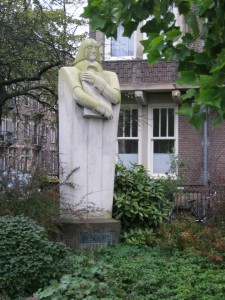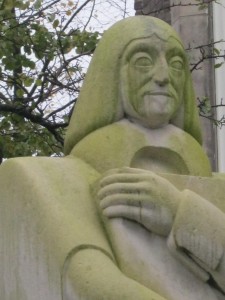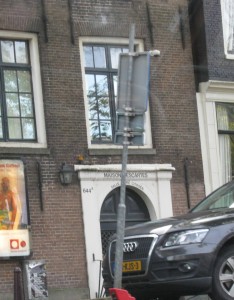Philosophy is a wonderful thing to study, but it doesn’t lend itself well to vacationing. Quick: name your top five favorite philosophical tourist destinations! See what I mean? All that focus on disembodiment has really gotten in our way. It’s so hard to go anywhere unless you have a body that can be transported.

Professor Phil Voight, fortifying himself for an afternoon of philocaching. In the spirit of full disclosure, I must report that one of the food items he is holding is actually mine.
But it’s not impossible. On a recent trip to Amsterdam and Edinburgh, for instance, I was able to engage in what I’ve come to call “philosophical geocaching” (philocaching?)—i.e. traipsing all over Huckins in order to locate those objects that: 1) are vaguely related to famous philosophers; 2) are located in deeply obscure places; and 3) have been ferreted out and signposted (in ways equally vague and obscure) by other members of the philosophical touring public. Thanks to the wonders of the internet, some minimal advance planning, and my vivid imagination, I was able to entertain myself and my traveling companion for several delightful afternoons, looking for philocaches in both cities. (Well, okay, I was able to entertain myself, and I was able to coerce my traveling companion’s participation using food bribes.)
Descartes, as the song notes, lived in Amsterdam. During his twenty years in the Netherlands (the twenty years in which all his major philosophical works were produced, BTW), he spent three extended periods of time in Amsterdam proper. Work at it assiduously and you can find three Descartes caches commemorating his residency. I didn’t work hard enough; I only found two:
1. According to one internet tourism source, Maison Descartes (Westermarkt 6) is the house in which ol’ Rene lived when he wrote The Passions of the Soul. Alas, since he wrote that work in 1645-6, during which time he was living in the Dutch village of Egmond-Binnen (and finished it in Sweden, where he was lured by one Queen Christina, and where he died not long afterward, but not before allegedly writing the verses for a ballet*), this claim seems like philosophical wishful thinking. It is now a French language school. (Maison Descartes, that is; not The Passions of the Soul. That is still just a book.)
To the right is an appropriately-obscure photograph of the entry to Maison Descartes, taken (by me) from a canal boat. I could never seem to relocate the place when I set out to find it on foot, but I’ve heard it has beautiful gardens in its inner courtyard. (e
You may think it doesn’t count as geocaching if I tell you the street name on which a particular cache is located; shouldn’t a GPS be required? In a word, no: philosophical geocaching isn’t like regular geocaching, because its practitioners (philosophers, for the most part) are more easily baffled by the external world, and thus more likely to find regular old street addresses challenging enough to navigate. And in a second word: Amsterdam. Wayfinding in Amsterdam is not like wayfinding in, oh, a city without canals and streets that run at right angles. Even ordinarily-endowed pedestrians can find themselves lost in Amsterdam.
 2. In a city dotted with substantial commemorative pleins (plazas or squares) that are clearly marked on maps, the plein named after the magnificent painter Johannes Vermeer must win the prizes for both “smallest” and “least well marked.” Surprise! It’s also the site of the other Descartes philocache I was (finally) able to locate—the interestingly stylized statue of the philosopher, clutching what looks like the Ten Commandments. Here are some of my attempts at Arty Photographs of the statue. (For a real photographer’s depiction of this statue—as well as photos of many living philosophers—visit Sijmen Hendrik’s site.)
2. In a city dotted with substantial commemorative pleins (plazas or squares) that are clearly marked on maps, the plein named after the magnificent painter Johannes Vermeer must win the prizes for both “smallest” and “least well marked.” Surprise! It’s also the site of the other Descartes philocache I was (finally) able to locate—the interestingly stylized statue of the philosopher, clutching what looks like the Ten Commandments. Here are some of my attempts at Arty Photographs of the statue. (For a real photographer’s depiction of this statue—as well as photos of many living philosophers—visit Sijmen Hendrik’s site.)
*About that ballet: Long ago in some philosophical journal, I read a translation of this work–referred to there as an opera libretto–and have thus long nurtured the belief that Descartes really did write a work called “The Birth of Peace.” A recent book by philosopher Richard Watson puts my fond belief to rest, alas.
